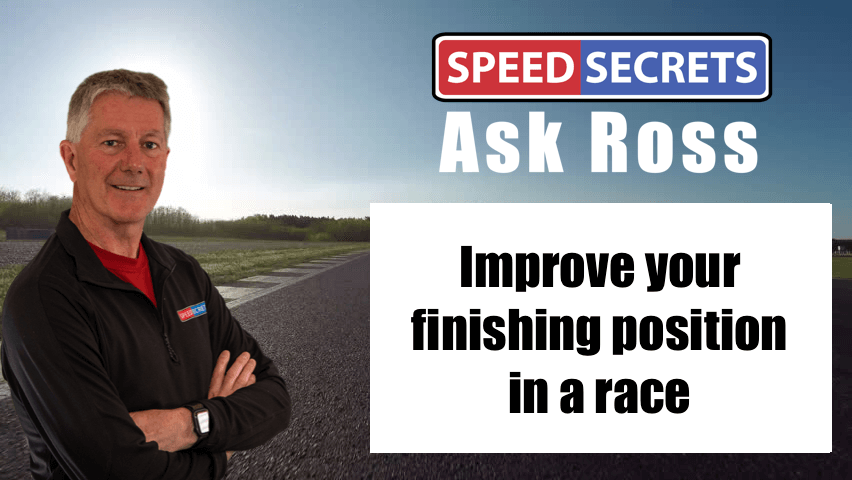 Q: “Is it that everyone has reached the limits of their natural abilities, or is it that most everyone has plateaued in their development as a racer? I have raced Touring 4 and SM in the SCCA for three years. As I have come to know the fields of racers, I am now able to very reliably predict the grid and finishing positions of almost every driver. I find little variance from race-to-race and from track-to-track. I am also in a sim racing league where the cars are equalized, yet the same is true in this league… everyone finishes pretty much where they are ‘expected’ to finish in every race. If the answer is that all, or most, of these drivers have plateaued in their development as a racer and that many drivers racing at mid-pack have the opportunity to become podium-contenders – natural abilities be damned – then what elements should be part of my two-season plan to move from mid-pack to podium-contender at the SCCA run-offs two years hence? I know you say that we must practice with purpose and not just accumulate seat time, but I would like to hear what a more fleshed out, two-year plan would look like.”
Q: “Is it that everyone has reached the limits of their natural abilities, or is it that most everyone has plateaued in their development as a racer? I have raced Touring 4 and SM in the SCCA for three years. As I have come to know the fields of racers, I am now able to very reliably predict the grid and finishing positions of almost every driver. I find little variance from race-to-race and from track-to-track. I am also in a sim racing league where the cars are equalized, yet the same is true in this league… everyone finishes pretty much where they are ‘expected’ to finish in every race. If the answer is that all, or most, of these drivers have plateaued in their development as a racer and that many drivers racing at mid-pack have the opportunity to become podium-contenders – natural abilities be damned – then what elements should be part of my two-season plan to move from mid-pack to podium-contender at the SCCA run-offs two years hence? I know you say that we must practice with purpose and not just accumulate seat time, but I would like to hear what a more fleshed out, two-year plan would look like.”
A: Wow, that’s a brilliant question. And a BIG one, as your two-year plan is likely to be different from most other drivers’, as where you’re at now is likely different. But let’s start at the beginning.
Based on many years of experience, I strongly believe that most drivers have not reached the limits of their abilities. Instead, the answer to your first question is closer to “having plateaued,” and there could be many reasons for that. The first reason might just be a limitation of the “resources” that most drivers can apply to the challenge. By resources, I’m talking about time, the amount of effort someone wants to put towards it, knowledge, and obviously, money.
I’ve talked with many, many drivers who are mostly happy with where they’re currently running. Sure, they’d like to qualify and finish higher up the grid, but they’re not willing to do what it takes to make that happen. I’ve never met a driver who could not improve, so I don’t believe it has anything to do with a lack of natural talent. Okay, if they wanted to get to F1 or Indy cars, maybe they don’t have the talent to get to that level. But they do have the ability to move up the grid, if they have the ability to commit the time, etc. So, some of it comes down to desire, and there’s nothing wrong with not having the desire to do what it takes. In fact, it takes a ton of desire and commitment to improve, and for some, it’s not worth the effort. If I told a driver that they needed to be in the gym training for two hours a day, doing mental training one hour a day, studying data and video every day, and spending more time ensuring their car is prepped and tuned better, many would say “No thanks” (if they were honest with themselves). And most of that doesn’t really cost much money.
With that in mind, this gets to the bigger part of your question: What specifically to do if you do have the desire and commitment it’ll take to move up?
My first reaction to the question is: hire a coach. No, I’m not looking for work! But I – or anyone else – can’t sit here and tell you exactly what to do without first knowing what you need to improve. And a good coach is best at determining where your racing is at, and what needs to be prioritized. If anyone – a coach, fellow driver, friend, whoever – tells you they know exactly what you need without establishing where you’re at now, run away from them. 🙂
In general terms, I always start by trying to determine what the big priorities are:
- Outright speed?
- Racecraft?
- Track knowledge?
- Car setup feedback?
- Physical fitness?
- Mental training?
There are other areas, such as how to get the best out of your team (even if you and you alone are the team, or it’s you and a friend or spouse), having enough budget, etc. But these six are the main areas that need the most attention.
Start by asking yourself what’s holding you back the most from finishing higher up the field, and potentially winning every race. Do you simply need more speed? Or, if you had more speed, do you need to get better at passing, being passed, and race strategy (racecraft)? Is it a lack of specific track knowledge that some drivers are better at than you? Or is it your ability to sense what your car needs to be faster, and then how to make those changes (or communicate them to someone who knows how to make those changes)? Are you physically the most fit driver in the field, and if not, is that holding you back? What about your mental game – your ability to learn faster, stay focused, switch your mind on, and consistently perform at your best?
Of course, asking you what is holding you back may lead to a different answer than if a qualified coach came in, observed, and made their recommendation….
Let’s stop and look at consistency for a moment. Think about when you’ve performed at your very best, and consider that as your “100.” How often do you perform at your 100? Every single time, or “not enough” (a fairly common answer to that question). If “not enough,” then maybe your priority should be on performing at your best more often, rather than trying to improve your 100. I hope that makes sense. Many drivers get caught up in trying to improve their 100, when what they should do is learn how to perform at their 100 more often. If you’ve performed at that 100 in the past, then you have the skill/talent to do so, and that means your priority should be on accessing that 100-level skill/talent more often. That’s a mental game challenge.
If I had to give you a 2-year plan right now, I’d ask you to pick just two areas from the above six, and let me know what they are. Then, the goal would be to identify three areas in each of those to prioritize. For example, if you choose “Car setup feedback,” I’d suggest starting by reading everything you can about setup tuning (I have a free eBook at https://speedsecrets.com/tune-car-handling/; then read all the books by Carroll Smith). Then I’d suggest you spend time on track (real and sim) doing “sweeps,” where you go from one end of the adjustments on springs, anti-roll bars, dampers, toe, camber, ride heights, aero, and so on, and then to the other end. The goal is to learn what each change feels like, and eventually get so you can feel/sense even small adjustments. If you take the time and effort to do that, you will improve your ability to tune your car’s handling. Of course, it’s one thing to sense the changes, and another to know what you want (or should want). In the eBook I mentioned, I have what I call the Handling Debrief Process. If you use that each and every time you come off track, you’ll get better at learning what you want.
For physical training, I’d recommend using the services of people like Trey Shannon at PitFit in Charlotte, and get him to give you a baseline workout program, and then do regular check-ins with him to raise your fitness level.
For outright speed, there are so many things that go into that, it’s hard for me to pick just one or two, here. But certainly, I’ve written a lot about the different techniques that will lead to the biggest gains, such as focusing on your brake release. Or doing Sensory Input Sessions. Or developing your vision skills. Or adapting to handling issues. Or… Again, though, is it outright speed, or consistency that you need most?
Racecraft is one of the hardest to improve because you learn most from experience. Obviously, lots of sim racing can help, but as you probably know, some sim racers don’t race the way real-world racers do. Doing mental imagery and replaying different passing scenarios in your mind is super helpful, so take at least 30 minutes every day to do that. (I have an eBook about using mental imagery at https://speedsecrets.com/product/mental-imagery-guide-for-drivers/)
Of course, mental training is more than just doing mental imagery/visualization, but it is the foundation. It should be a way of life; you spend time every single day doing it to help program your mind to do what you want to do, at the right time.
Track knowledge starts with lots of study or videos, reading, reviewing data (comparing differences, rather than simply looking at your fastest laps), and experimenting.
I’m barely scratching the surface here…. And, I suspect I’ve only just confused you more, or turned this into such a big project that you think, “No thanks.” Which gets back to your first question: the reason many drivers reach a certain point, and then don’t improve is that they’re not willing to do what it takes. Or they don’t know what they should do to improve. And as you can see, it can take a lot. Having said that, what you learn from the process is something that you’ll benefit from in every area of your life, forever.
Finally, I have a feeling that you do have the desire to take your racing to the next level, so please let me know how it’s going. And have fun!

